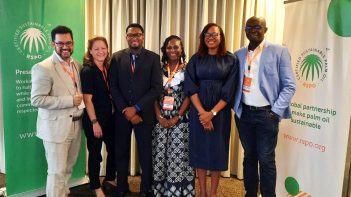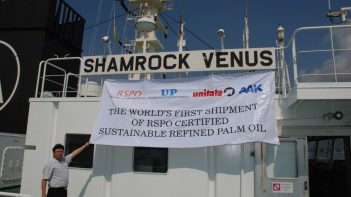Bangkok, 31 May 2022: Today, Thai policymakers and business actors came together for the Second Business Forum, jointly organised by the Roundtable on Sustainable Palm Oil (RSPO) and the Deutsche Gesellschaft für Internationale Zusammenarbeit GmbH (GIZ), to discuss the vital role Thailand can play in ensuring global food security, as well as meeting the global demand for sustainable edible oils, through enhanced agricultural practices, production, and global certification standards such as RSPO.
As the world’s third largest palm oil producer, Thailand’s development potential for certified sustainable palm oil (CSPO) is significant. Palm oil, being the most efficient vegetable oil crop on the market that meets 40% of the global demand for vegetable oils while only occupying 6% of the land used to produce vegetable oils, can be especially beneficial in ensuring global food security for a growing population expected to reach 9.8 billion by 2050.
While oil palm smallholders account for over 70% of palm oil production in Thailand, they nevertheless lack opportunities to access microfinancing programmes, skills and knowledge about sustainable farming, as well as certification standards, which would enable them to access global markets.
Against this background, the Department of Agricultural Extension and Department of Agriculture have joined forces with GIZ through the Sustainable and Climate-Friendly Palm Oil Production and Procurement (SCPOPP) project. Through this project, 19 palm oil companies have been engaged to support and train over 3,000 oil palm smallholders in sustainable farming practices. Over 200 trainers, who have undergone training themselves, have successfully trained and engaged with more than 3,000 smallholders. Moreover, in 2021, 400 smallholders achieved RSPO certification and successfully connected to the global market, and another 1,500 smallholders are currently being trained and are expected to achieve certification by the end of 2022.
Alongkorn Phonbutr, Advisor to the Minister of Agriculture and Cooperatives, gave a special lecture themed around raising the standard of sustainable palm oil production in Thailand. He highlighted development plans for palm oil production under Thailand’s reform plan of 2017-2036 in line with the 20-year national strategy.
“The Ministry of Agriculture has set an important goal of expanding the oil palm plantation area in Thailand,” said Phonbutr. “We are increasing the yield per rai (.16 ha) by no less than 10% and the extraction rate of 22-23% to increase productivity to meet future demand, including maintaining palm oil exports at 3.7 hundred thousand tonnes per year”.
Phonbutr added that the Ministry of Agriculture, alongside RSPO, will work to raise the standards of sustainable palm oil production in Thailand. Furthermore, the National Bureau of Agricultural Commodity and Food Standards (NIDA) has also announced that it will establish four standards on agricultural commodities related to oil palm.
“Considering various crises with unpredictable volatility, this is an opportunity for all parties to review and share our goals towards a more sustainable future,” said Alongkorn. “Establishing the Thailand Sustainable Palm Oil Alliance could not come at a more perfect time. The Ministry of Agriculture and Cooperatives is pleased to support the establishment of such a network to raise the standards of Thailand for sustainable palm oil production. We continue to cooperate closely with the networks of all sectors, including the public sector, the private sector and civil society.”
Ensuring smallholder Inclusion
In his opening address, RSPO’s Chief Executive Officer Joseph (JD) D’Cruz said, “Thailand finds itself in a unique position to help ensure global food security as the world’s third largest palm oil producer. What sets Thailand apart is the capacity of smallholders to propel the Thai palm oil industry. RSPO recognises the integral role of smallholders in achieving our overall vision of market transformation; ensuring their greater inclusion in sustainable solutions that positively impact their livelihoods remains one of our main goals. We see this as a shared responsibility that all players in the palm oil supply chain must commit to supporting.”
In his welcome address, GIZ Country Director for Thailand and Malaysia, Mr. Reinhold Elges said, “Food security is a controversial topic in international discussions. Moving towards sustainable and deforestation-free production and climate change mitigation and adaptation has become an essential pathway to secure food production and meet global demand. In Thailand, where palm oil production associated with forest destruction and violation of human rights is nearly non-existent, the Thai palm oil industry nevertheless faces the big challenge of inefficient farming practices by small-scale farmers. Mobilising investments to engage oil palm smallholders and enhance their capacity to achieve RSPO certification – which we regard as a viable Shared Responsibility – means upgrading Thailand’s palm oil industry to meet the global market, as well as helping to secure global food supply and reducing negative climate and environmental impacts.
At present, RSPO certified sustainable palm oil represents 19.3% (14.8 million tonnes) of the total global palm oil supply, and in Thailand, RSPO certified sustainable palm oil accounts for just /2.8% of the country’s total palm oil supply.
“GIZ works with both public and private partners to mainstream sustainable palm oil production in the country. We developed an interactive train-the-trainer learning programme, the Thailand Oil Palm Smallholder Academy (TOPSA) adopted from RSPO Smallholder Training Academy (STA) and organised a series of intensive training sessions to improve the capacity of over 3,000 smallholders in sustainable agricultural practices to achieve RSPO certification, and gain improved access to international markets.
“Trainers are key in engaging and improving smallholders’ capacity and knowledge on sustainable palm oil production. Therefore, the project invites and welcomes any organisations interested in supporting smallholders by becoming TOPSA partners and unlocking the potential of the Thailand palm oil industry together,” he said.
JD added, “In 2019 RSPO adopted the Independent Smallholder (ISH) Standard, which aims to help more smallholders achieve certification through a stepwise mechanism, while adhering to the key sustainability requirements. Despite the challenges of the global pandemic, we have witnessed positive progress among smallholders towards achieving ISH certification.”
RSPO Thailand Membership
As of May 2022, RSPO Thailand oil palm grower membership consists of 63 groups of small-scale and large-scale farmers, of which 19 are RSPO Certified Independent Smallholder groups representing over 5,400 farmers with a certified area of 170,591.81 rai (27,295 ha), or 2.8% of the total oil palm plantation area.
In addition, 34 groups representing 1,386 smallholder farmers covering 27,766.83 rai (4,442.7 ha) are in the process of achieving certification, and are expected to be completed by the end of 2022. As a result, Thailand will have 279,406.81 rai (44,705 ha) of RSPO certified sustainable oil palm plantations, accounting for 4.58% of Thailand’s total oil palm plantation area.
RSPO Thailand also has supply chain members, including 11 Consumer Goods Manufacturers, 32 Processors and Traders, 39 Supply Chain Associates and 1 Associated company, 146 companies in total.
About RSPO:
The Roundtable on Sustainable Palm Oil (RSPO) was formed in 2004 with the objective of promoting the growth and use of sustainable oil palm products through credible global standards and engagement of stakeholders. RSPO is a not-for-profit, international, membership organisation that unites stakeholders from the different sectors of the palm oil industry including oil palm producers, palm oil processors or traders, consumer goods manufacturers, retailers, banks and investors, environmental or nature conservation NGOs, and social or developmental NGOs.
This multi-stakeholder representation is mirrored in the governance structure of RSPO such that seats in the Board of Governors, Steering Committees and Working Groups are fairly allocated to each sector. In this way, RSPO lives out the philosophy of the “roundtable” by giving equal rights to each stakeholder group, facilitating traditionally adversarial stakeholders in working together to reach decisions by consensus, and achieving RSPO’s shared vision of making sustainable palm oil the norm.
The seat of the association is in Zurich, Switzerland, while the secretariat is currently based in Kuala Lumpur with satellite offices in Jakarta (ID), London (UK), Zoetermeer (NL), Beijing (CN) and Bogotá (CO).
About GIZ:
Owned by the German government, the Deutsche Gesellschaft für Internationale Zusammenarbeit (GIZ) GmbH provides services in the field of international cooperation for sustainable development. GIZ works on behalf of public and private sector clients both in Germany and overseas. These include the governments of other countries, European Union Institutions, the United Nations, World Bank and other donor organisations. GIZ operates in more than 120 countries. We have approximately 20,000 staff around the globe, some 70% of whom are national.
For further information, kindly contact:
| RSPO Communications Team | Kanokwan Saswattecha, PhD.
Project Manager, Sustainable and Climate-Friendly Palm Oil Production and Procurement (SCPOPP) in Thailand |
Keep reading
Call for Proposal: Study on Wild Palms in West and Central Africa

RSPO hosts first Africa downstream sustainable palm oil supply chain forum in Cape Town

Nearly two decades on, Europe continues to drive global demand for RSPO Certified Palm Oil

Communicating Sustainable Palm Oil - examples of success across Europe
[EOT] Terms of Reference: Independent Smallholders Outreach Programme in Indonesia

RT2023 Delegates Propose Solutions to Reinforce RSPO’s Assurance System – End-Year Highlights of Assurance Standing Committee
RSPO UK Members' Day Examines Shifting Dynamics of Doing Business within Europe

Celebrating 20 Years of RSPO’s Sustainability Journey




